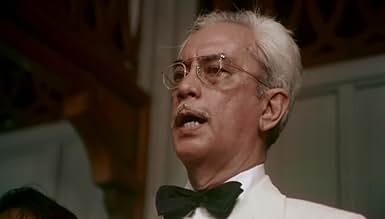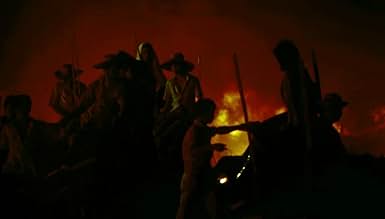अपनी भाषा में प्लॉट जोड़ेंTwo affluent families struggle and learn to survive during the Japanese occupation in the Philippines.Two affluent families struggle and learn to survive during the Japanese occupation in the Philippines.Two affluent families struggle and learn to survive during the Japanese occupation in the Philippines.
- पुरस्कार
- 8 जीत और कुल 8 नामांकन
Fides Cuyugan-Asensio
- Inday Lorenzo
- (as Fides Cuyugan-Asencio)
Mitch Valdez
- Jo Russell
- (as Maya Valdez)
Benjamin Delina
- Ponso
- (as Ben Deliña)
फ़ीचर्ड समीक्षाएं
I first watched this film in the 1980s when I was still in College and boy I was so impressed it left a lasting impression on me...40 yrs later I rewatched it in Netflix and it still has the same effect on me... this film is timeless and now considered a classic in Philippine cinema..so proud of this film and this immortalizes the director Peque Gallaga- may he rest in peace! Feeling nostalgic seeing the young Cherie Gil as Trining- one of the greatest actresses in Philippine cinema -she recently passed away and Im glad I got to watch her again in this film. Highly recommended to all millenials and younger generation of Filipinos to watch this -its a gem !
Without any offence to Filipino cinema, this movie was horrible. I was misled by the number of people calling it a masterpiece and my love for foreign and historical films, and couldn't expect what was coming. I suffered so much watching it that in the end I sympathised with that girl begging to be shot in the head. The reasons of my suffering in brief:
1. Sound design is extremely bad, struggling to listen to the characters' voices, the SFX were childish.
2. Unnecessarily long (3 hours that felt like 5). Impressed to learn that was initialy 5h long...
3. Nonsensical and unrealistic violence, made you feel like you are watching a low budget splatter.
4. That joke of a Rambo-like fighting scene near the end of the film that was so amateurishly executed and so long, that felt as if it was a practical joke on the viewer
5. Random sex happening
6. With the exception of a couple of good scenes (like the hacienda fire), the cinematography/photography was very dull
7. Characters (even ghosts) appearing and disappearing without meaning or connection to the plot
8. Excuse my OCD, but even the title Oro, plata, mata (3 part) is not in accordance with the film which is somehow in 4 parts (city, hacienda, forest house, slaughterhouse).
9. The relationships between the characters in the plot were very superficial. Despite the good acting from a couple of the ladies, the rest was so thin that it couldn't hold together the plot.
In case you are expecting to watch a historical epic movie (like the ones OPM is often compared to) I would really suggest you skip. Instead of the treasure you are seeking, you will find a carton of spoiled milk.
In case you are expecting to watch a historical epic movie (like the ones OPM is often compared to) I would really suggest you skip. Instead of the treasure you are seeking, you will find a carton of spoiled milk.
One of the notable films in Philippine cinema, "Oro, Plata, Mata" (Gold, Silver, Death) is one of the epics of the silver screen immersive in breadth and scope. Set on the eve of the Japanese invasion of the Philippines during World War II the tale depicts two wealthy land owning families from the province whose affluent existences are turned upside down with the outbreak of war. From there it's an odyssey into the heart of darkness as social barriers break down and an endurance test of life-changing events ensue. Ace direction and good acting are further highlighted and complemented by the flawless editing and cinematography. If there's one flaw with the film it's the length. While watchable the movie would have had more of an impact in shorter form with the slow parts excised to heighten the best and gripping parts. Perhaps famed director Peque Gallaga's masterpiece and some of the best acting by the country's film luminaries, "Oro, Plata, Mata" is one of the most successful triumphs of art as life.
10dokvader
Oro Plata Mata is not just a war film. It is a harrowing exploration of how quickly civility crumbles in the face of brutality. Set against the backdrop of the Japanese occupation of the Philippines during World War II, the film follows two wealthy families seeking refuge deep in the jungle, only to find that their gilded escape offer no true refuge from the chaos that is upon them. Instead of focusing on battles, Gallaga masterfully portrays the insidious erosion of the human condition.
The film is visually stunning, with great shots of the Philippine landscape. Gallaga uses symbolism effectively, particularly the recurring motif of the "oro, plata, mata" (gold, silver, death) game played by the families, which foreshadows their inevitable decline. While the narrative sometimes suffer from pacing issues, the performances are strong and compelling. The characters' development is deeply unsettling and shows the moral compass of each.
The movie avoids simplistic portrayals of black and white. Instead, it explores the complexities of collaboration and resistance, highlighting the moral ambiguities that arise in times of war. It's not merely a story about the horrors inflicted by the enemy but also about the internal conflicts and fracturing of relationships within a society under siege.
It is both a powerful and an unforgettable cinematic experience. Gallaga's film is a reminder of the devastating human cost of war, extending beyond weapons and skirmishes. It's a film that makes you think on the fragility of civilization and the fall of the human mind.
The film is visually stunning, with great shots of the Philippine landscape. Gallaga uses symbolism effectively, particularly the recurring motif of the "oro, plata, mata" (gold, silver, death) game played by the families, which foreshadows their inevitable decline. While the narrative sometimes suffer from pacing issues, the performances are strong and compelling. The characters' development is deeply unsettling and shows the moral compass of each.
The movie avoids simplistic portrayals of black and white. Instead, it explores the complexities of collaboration and resistance, highlighting the moral ambiguities that arise in times of war. It's not merely a story about the horrors inflicted by the enemy but also about the internal conflicts and fracturing of relationships within a society under siege.
It is both a powerful and an unforgettable cinematic experience. Gallaga's film is a reminder of the devastating human cost of war, extending beyond weapons and skirmishes. It's a film that makes you think on the fragility of civilization and the fall of the human mind.
In honor of Peque Gallaga's life, I finally grabbed the chance to watch his masterpiece. Man, I am deeply ashamed that it took me this long to see it. This is in all ways the most complete Filipino film I ever had the privilege to witness. From the breathtaking photography, haunting music, and humanistic characters to impressive writing and radical directing, Oro, Plata, Mata has it all. Now, it all makes sense why this is widely celebrated and regarded as one of the greatest Filipino films ever. Let me add further that this is one of the best in the world! I was moved. No, knocked out of my seat how it had shown boldly the colorful heritage we have. Time and time again, we are reminded that the crucial enemies Filipinos face are ourselves. It's sad and enraging how it still rings true up to this time, more than 75 years after. All the collective trauma this nation faced are seem to be forgotten and pushed back inside us to give an illusion of victory. But have we learned? Did we move forward? Until we acknowledge our roots, study the past, demand accountability, and take control of our own history, Filipinos will just keep killing Filipinos. We will never rise truly.
Thank you Peque Gallaga for gifting us this Filipino treasure that I will now hold close to my heart. Safe to say, I already found what I have always been looking for in that little corner of our history. May you rest in peace.
Thank you Peque Gallaga for gifting us this Filipino treasure that I will now hold close to my heart. Safe to say, I already found what I have always been looking for in that little corner of our history. May you rest in peace.
क्या आपको पता है
- ट्रिवियाThe opening quote was written by Nick Joaquin. Peque Gallaga, the director told Jose Javier Reyes, the film's screenwriter, to create a frame reference for it and he cited a quote from the well-known writer.
- साउंडट्रैकMignon: Act II, Polonaise
Written by Ambroise Thomas
Performed by Lily Pons, Soprano, with RCA Victor Symphony Orchestra (as Victor Symphony Orchestra)
RCA Victor
टॉप पसंद
रेटिंग देने के लिए साइन-इन करें और वैयक्तिकृत सुझावों के लिए वॉचलिस्ट करें
- How long is Oro, Plata, Mata?Alexa द्वारा संचालित
विवरण
- रिलीज़ की तारीख़
- कंट्री ऑफ़ ओरिजिन
- आधिकारिक साइट
- भाषाएं
- इस रूप में भी जाना जाता है
- Gold, Silver, Death
- फ़िल्माने की जगहें
- उत्पादन कंपनी
- IMDbPro पर और कंपनी क्रेडिट देखें
- चलने की अवधि
- 3 घं 14 मि(194 min)
- ध्वनि मिश्रण
- पक्ष अनुपात
- 1.33 : 1
इस पेज में योगदान दें
किसी बदलाव का सुझाव दें या अनुपलब्ध कॉन्टेंट जोड़ें













